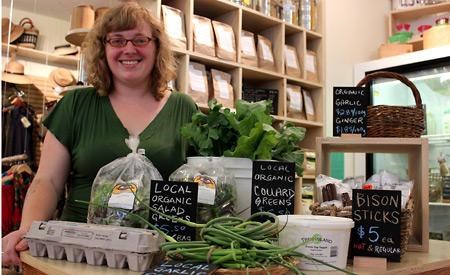Some local food advocates in Powell River are not impressed with a change in what local means.
The Canadian Food Inspection Agency (CFIA) has adopted an interim policy that changed the definition of local. It came about as part of an initiative to review its food labelling regulations, guidelines and policies.
Under the old definition, food had to be produced within 50 kilometres of where it is sold, or in the same or an adjacent municipality, to be described as local. Under the new definition, any food produced in BC and within 50 kilometres of the provincial border qualifies as local.
The CFIA has implemented the policy already and says it will remain in effect until its labelling review is complete.
Lyn Adamson started the 50-mile Challenge in Powell River six years ago. This year’s challenge takes place from August 4 to September 22. During this time, participants commit to eating as much of their regular diet as they can from local sources, food raised, grown, foraged, processed, picked or purchased from vendors who have done so, within 50 miles of Powell River.
Expanding the definition of local food to include all of BC was done to please large producers who want to get in on the new local movement, said Adamson. “It’s a niche market and the BC-grown folks are trying to capitalize on that as large producers,” she said.
Unfortunately, what will happen is that members of the public who are not that well informed will start to revert back, Adamson said, because they’ll probably be able to have lower prices. “You’ll have two things on the shelf that are going to say ‘Locally Grown,’ and the one, because of economies of scale, will be able to have a better price point,” she said. “It will undercut the work of our local producers here. People who are looking for that label are probably looking for their neighbours.”
Already there are rules that allow producers to slap on a BC label even if a lot of the food isn’t produced in BC, Adamson also said. “Even as simply as adding one or two ingredients and then packaging it in BC allows you to put on a BC label,” she said. “Will they edge into being able to put on a local label on something that perhaps wasn’t even made in the country?”
David Parkinson, coordinator of Powell River Food Security Project, an initiative of PREP (Powell River Employment Program) Society, said CFIA is taking a perfectly useful word that most people have some definition for and making it meaningless, especially in a large province like BC. In Powell River, most people think local means 50 miles or even less, he added. “I can’t believe that it’s going to end up staying this way,” he said. “It seems like a provisional change they’re making and then there is going to be consultation around it. It’s just bizarre to think that we’d be buying stuff from anywhere in BC and the people would feel comfortable calling it local.”
If the new definition is adopted permanently, Parkinson said people will laugh at it and continue to use local the way they have always used it. “When they see it on a label, they just won’t really believe it anymore,” he said.
Something like that has already happened to the word organic, among more careful consumers, Parkinson said. “There’s a little bit of distrust around organic because of the changes in the standards,” he said. “They’re doing the same thing to the word local.”
It’s unfortunate, Parkinson added, because for many people, local was the new organic, “the thing you could really trust. You can’t really trust that term anymore.”
Helena Bird is the president of Powell River Farmers’ Institute and owns and operates Hatch-a-Bird Farm, a certified organic farm, with her husband, Peter. She said when she thinks of local, she thinks of something that has been grown within the Powell River Regional District. “I don’t think of something that’s grown in my province,” she said.
As well, Bird said she is for eating in season. “It’s nice to have local, with whatever will grow in your region at that time,” she said. “But it’s also nice to take advantage of mangoes in that country’s mango season. It’s also nice to take advantage of the Okanagan for fresh fruit, because we can’t grow it here.”



